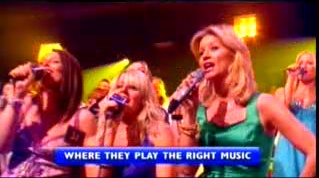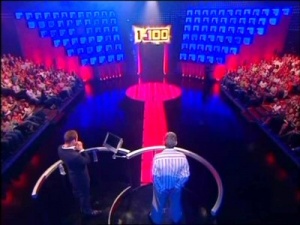Weaver's Week 2008-07-20
Last week Weaver's Week Index Next week
"Dear ITV, I had the misfortune to sit through 5 mins or so of Who Dares Sings on Saturday. Apart from the horrendous pun title, it is quite simply the worst show I have EVER seen on television. Sheer torture.
Contents |
Who Dares Sings!
ITV, Saturday evenings
Since the beginning of the century, autumn Saturday nights on ITV have meant a singing competition. In the beginning, there was Pop Idle and Popstars: The Rivals, latterly The X Factor. All of these shows have rewarded people who can sing a bit, who look pretty, but mostly who can make Simon Cowell lashings and lashings of money. The actual performers are interchangeable. The hosts tended to the anodyne, reaching a nadir of nonentityism with the recruitment of Kate Thornton.
After her, anyone would be an improvement. Even a show that combines the presenting talent of Denise Van Outen, and singing talent of Ben Shephard ranks as an improvement. Miss Van Outen is both a television presenter and singer, and she's been in a hit West End musical, you know. And on the panel of the BBC's casting competition I'd Do Anything. Mr. Shephard, meanwhile, appears to have been recruited because he's young and able to hold a moderately complex format together, as demonstrated on One Versus One Hundred. It helps that he mimes as though he were a member of a boy band, and it really helps that he does rather look like he could have been in a boy band in the recent past.
The blurb for this show was as follows:
- "Who Dares, Sings! will challenge every single member of our studio audience to hit the right notes in the largest karaoke competition on TV. All jostling for their moment under the spotlight, one bum note could mean elimination from the competition. But for one contestant, their voice could earn them a life-changing sum of money."
- "So whether you think you're the next Leona Lewis, or just a local karaoke king or queen who likes to go for it no matter who's watching, then we want to hear from you! You don't need to have the best voice in the world to apply, but enthusiasm, a huge personality, and the confidence to sing in front of millions of people is a must!"
All of the audience have applied via an 0898 number, and (we presume) have been auditioned for singing ability and exuberance. Like our hosts, the audience is a little excitable, and begins the show with a mass singalong to a popular tune. There's then another singalong, from which two people move to the main stage. They give solo performances, and the better performance moves on to the final. Repeat for a second finalist, and compare a second solo performance to find the winner, who can win money. Before each commercial break, insert another mass singalong.
Now, let's go through that in turn. The opening number, and the pre-break singalongs, are all for entertainment only. Miss Van Outen joins the performers, and everyone has a wonderful time. Including the viewers at home, especially if they're close to the mute button. The competitive mass singalongs both feature five singers picked out "at random". How random is this random choice? Let's give as much credit as possible, and assume that all the numbers are in a large bag, and sets of five are pulled out before filming begins.
Each of these five is assessed on the ten hidden notes, by a mechanism we'll discuss later. None of the singers know they're being marked unless they're called forward; the best two of those singing will move forward to the front of the stage. There, they'll compete in a "pitch battle". See what they did there? A battle of pitches, musical notes. Cor, an actual joke that's going to go over the head of at least half the viewing millions*.
In the pitch battle, the contestants are given a list of sixteen possible songs, each a favourite at karaoke, and very familiar to listeners of independent local radio. Each contestant must pick one of the sixteen songs. The hosts encourage them to pick one that they know well; if in doubt, we reckon the tactic is to go for a song that has a very small vocal range. "Mull of Kintyre" yes, "My Way" no.
Anyway, the contestants are allowed to take a place at the front of the stage, and strut their stuff. It won't influence the judging computer, it's only interested in pre-determined samples of their singing, but it'll help the performers perform. Shephard and Van Outen give the scores with a modicum of fuss, and determine the winner.
We can't go much further without discussing the scoring. According to our hosts, the idea of the show is to keep in tune. Specifically, the aim is to hit and hold ten pre-selected notes in the course of a 90-second performance. According to the blurb, evaluation is done objectively, with a computer (the Sound Analysis Machine, or Sam) awarding a mark out of 100, and averaging those marks out. As recently as last year, it was acceptable for humans to judge such performances, and cast aspersions on the singer's abilities. In these post-0898gate days, you can't have humans interpreting the data.
This veneer of objectivity is, of course, superficial. The choice of which notes to evaluate is done by humans, it's not disclosed to the contestants, and is only partially disclosed to the audience at home. Though we know which words contain the notes, we don't know which actual notes they're marking. The algorithm to determine the quality of the performance is not revealed, other than it's something to do with "hitting and holding" the required notes. In practice, we believe the criteria are as follows:
- "Hitting the note" appears to be for achieving the correct note, probably relative to the one before and/or the one after. It's not fair to insist that blokes hit the B-above-middle-C, that note is generally out of their range. Men can sing an octave lower, and reach the B-below-middle-C; or one-and-a-half octaves lower, taking them to the F-below-middle-C; or something else. So long as the relative differences between the notes are correct, the singer is deemed to be in tune.
- For sustaining the correct note – or at least making a sound – for the required duration, with (or without) adornments and warbles. The "required duration" is a somewhat more subjective area: are we to follow the recorded version of the song? Are we to follow the model karaoke version, as defined by Swiftquill and Guy Protheroe (the latter credited as the "musicologist")? What if they differ radically?
It appears that both sections are marked on a scale from 0 to 1, then multiplied together and rounded to two decimal places. A perfect performance will score 100; one that's slightly off key seems to score about 80, and one that misses its timing will have difficulty reaching 50. A note that's short and badly off-key will not score more than about 10.
We mentioned that the choice of evaluated notes was interesting. With ten notes to choose, there's scope for a couple of short sections, a couple of extended notes, and some of the more interesting vocal sections. On at least one occasion, a contestant's been tested twice on precisely the same notes in a chorus and – not surprisingly – received similar marks both times round.
After three rounds of this, we're wondering why Radio 3 always puts opera out on a Saturday night, just when we'd like some soothing woodwind music, and why ITV insists on asking insultingly simple questions. We remember that Bros was composed of Matt, Luke, and Boris Becker, and we claim our ten pounds. And, after three Pitch Battles, we've found our winner. They can, in theory, win £50,000 from three performances. However, in order to win this, they've got to leap through some increasingly improbable hurdles.
The winner is shown five songs, and these appear to be carefully selected to match the winner's register. Male winners get songs performed by men, female winners by women, and matching high- and low-pitched songs in each sex. Just in case someone in the audience hasn't been assimilated by Global Radio's national local radio borg in the last year, we hear a brief snatch of the original. For the first performance, the winner is required to achieve an average score of at least 40 points on the computer's scale, and the reward for this achievement is £5000. If the winner couldn't reliably make 40 points, they simply wouldn't have made it this far in the show.
Assuming they get that far, the winner is now asked to sing a second song from the list of five. Their target here is to achieve an average of 60 points, a somewhat more difficult task. The contestant sings their song, and is then able to rate their performance: should they gamble on having made a good performance, or leave with the money they've already won?
If the contestant decides to have their song scored and has made the required standard, they win £25,000. If they decide not to have their song scored, they leave with £5000. If they have the song scored but haven't met the target, they leave with nothing. Successful contestants are able to make a third performance, where a score of 80 points is rewarded with £50,000. Having the song scored and failing to reach this target – and the singer would need to be almost perfect with every note – means they leave with nothing.
There's one other matter: we find it very difficult to get worked up about a prize of £5000. Even BBC daytime shows are prepared to give away that sort of cash. (OK, part of that is danger money from being in the same studio as Donny Osmond.) It's even more difficult to believe Ben Shephard getting worked up about £5000 when, on the other side, he's getting worked up about a One Versus One Hundred contestant winning ten times that amount. (Yes, Ben Shephard appeared on BBC1 and ITV at the same time, an honour usually reserved for royalty and the World Cup.)
It's the traditional Saturday night all-or-nothing gamble, it's an injection of jeopardy into the format, and it doesn't really work. After 40 minutes of brain-dead singing and cheering, it feels wrong to have the winner able to leave with nothing, like a grouchy party host throwing out the best singer just because they hit one wrong note. We'd far prefer to have the winner sing two songs, and award money from the average. Or the best single performance.
Last year's summer filler was JK and Joel's Sing It Back: Lyric Champion 2007, a show that didn't need people to be in tune, but to have a perfect knowledge of song words, right down to hair-splitting over "I've" and "I'm". This year, the ability tested is not to read words off a screen but to remember and reproduce a particular set of notes, for a specific duration, and in a certain tempo. A show about words, and a show about music. And, of course, if we mixed them up a bit and put them together, we'd get a show so complex that we would spend all night explaining the rules.
University Challenge
Match 2: Corpus Christi Oxford v Durham
It's a welcome return for a fixture of last series, the show's first starter is a definition: this week's word of the week is "Overture". It's answered by Corpus Christi Oxford, the first of the ten Oxbridge sides we'll see this (as every) year. CCO, as we tend to call them, was founded by monks but quickly became a centre for humanist study, and still teaches Latin and other Classical subjects. The most famous recent alumni are two cabinet members, Edward and David Miliband; it's not clear where their father Steve was educated.
CCO collected the trophy three years ago, and go on to take questions about time and Heath-Robinson contraptions before twice-winners Durham get off the mark. Durham claims to be the third oldest university in England (behind Oxford and Cambridge) and invited its early students to bring their own servants. Like its predecessors, Durham was organised along collegiate lines, but the colleges don't award their own degrees, so Durham only enters as a whole university. Alumni include that well-known election night double-act Jeremy and Tim Vine (well, at least the toe-curlingly unfunny half of the duo); it's not clear where their father David was educated. Back at the game, Corpus Christi have taken the first visual round – on how to construct a proper cup of coffee. Strong, black, two or three sugars; we call it a Catalano. CCO leads 85-15.
The Oxford side is aware to the most basic of navigational errors, unscrambling confusion between Stamford Bridge (site of 1066 battle) and Stamford Bridge (football ground in Kensington). They then get a set of words that differ by the omission of the letters "gh"; a head-louse and a period of darkness are "nit" and "night". Easier than it sounds, and we're sure that Will Shortz could spend three minutes on the subject one Sunday lunchtime. By the audio round – Verdi operas – Christ Church looks to be pulling away, leading 145-55.
It's good to see Thumper chipping in with salient facts about incorrect answers, explaining why they're wrong. Bonus points to the question-writers for linking a starter defining a recession with questions about gross economic instability. Just when Durham look to be coming back into the game – getting three starters in a row – Corpus Christi interrupts with their knowledge of Shakespeare, pull away with a full set of bonuses, and there really is only one winner. Even before the second visual round, every member of the CCO side has correctly answered a starter, just as City did last week. The visual round is on parliamentary buildings, and Corpus Christi's lead is an unsurpassable 200-65. We'll take Interruption of the Week
- Q: "Goblin Market and Other Poems" in 1862...
- Corpus Christi, Gail Trimble: Christina Rossetti.
We're impressed. Not just with this interruption, but with the team's wide range of knowledge. There are gaps in their combined knowledge, particularly biology, but they're not afraid to guess, and that could be the difference between winning and losing in a later round. Durham is assured of a place on the repechage board, but it's difficult to see a way back for them. CCO passes 300 points with a few minutes to go, and just run up the score, ending by suggesting that there's a settlement in Sardinia called "Motorola". Christ Church Oxford's commanding winning score is 330-95.
Gail Trimble was best on the buzzers for CCO, six starters, the side was correct in 34/48 bonuses. Tom Woods led the buzzer-banging for Durham, answering four starters correctly, but the side was correct in just 7/18 bonuses.
Next match: Royal Veterinary College London v York
This Week And Next
In Australia, Network Ten has decided not to renew its series of Big Brother after the current series ends. The stunts are criticised for being too silly, and ratings are down. We're talking really low down: one episode was beaten by ABC's coverage of an address by the country's prime minister. Things haven't been helped by the replacement of long-standing host Gretel Killeen by two radio presenters who could hardly string two words together and described their own work as "shabby". In the UK, Davina McCall has suggested that she won't be back after this year's show.
There are rumours that John DeMol is interested in buying ITV. The beaten-up banger of a television channel has been in need of a new owner since Granada and Carlton bought out their rivals in the 1990s. Others reported to be visiting the used station lot include NBC Universal, and RTL – the Germans will be able to offer Channel 5 in part-exchange.
Shooting Stars will return to BBC2 this December for a new episode, and a best-of compilation.
Ratings for the week ending 6 July, and we don't think we'll be saying this too often, but This Time Tomorrow was the most popular game show all week. The Tess Daly-fronted show had 5.25m on Saturday night. BBC1 took all three top places that Saturday, with Weakest Link (4.85m) and Last Choir Standing (4.75m). ITV might be worried, though Who Dares Sings! (4.15m) improved by 300,000 on its debut, it still failed to beat BBC1's Celebrity Masterchef (4.35m on Thursday). Big Brother led the way on Channel 4 (4.05m), and it helped 8 Out of 10 Cats to 3m. Scrapheap Challenge's annual final had 1.5m viewers, the same as Personal Services Required (the cause of much debate amongst the Games Adjudication Panel).
BBC2's best showing was from the unbilled Wednesday episode of Celebrity Masterchef, shunted over from BBC1 following the remarkable success of the British player in the tennis; 2.8m preferred Andi Peters to Andy Murray. On the digital channels, viewing is down. America's Got Talent led with 560,000, Come Dine With Me had 535,000, and Big Brother's Big Mouth had a season's best of 515,000. Year highs for Britain's Next Top Model on Living (360,000), for Brain-Jitsu on CBBC (195,000), and for Take It or Leave It on Challenge (125,000).
"Alistair took notes, Robert sounded as though he was getting up early, and Richard had a dozen and more. Fogg's travelling companion collects seven, except when he's Jacques. As ever, no prize if you can unlock the code." The key here was keys. Alistair Divall hosted Keynotes; Robert Kee was one of the Famous Five from TV-AM; Richard Bacon presented 19 Keys, a show almost as simple as our proposed Who Dares Sing It Back! In the Jules Verne novel, Phileas Fogg's travelling companion was Passe-Partout, a name taken by a character on the French version of Fort Boyard, where the aim is to collect seven keys. On the British version, the same actor played the same role, but under the name Jacques, and the target four or five keys. Another one of these next week.
Those of us who are up bright and early on a Sunday morning can see the live final of this year's Shipwrecked competition (C4, 11.20). BBC2 has Eating With the Enemy (4.30 weekdays), where home cooks try to impress food critics. It's the grand final of Celebrity Masterchef (BBC1, 8.30 Friday) and there's a new series of La Carte Aux Tresors (TV5, 5.23 Wednesday). And, for the millions who missed it last month, there's another chance not to see the Holby and Casualty The Weakest Link (BBC1, 6pm Saturday).
To have Weaver's Week emailed to you on publication day, receive our exclusive TV roundup of the game shows in the week ahead, and chat to other ukgameshows.com readers sign up to our Yahoo! Group.







